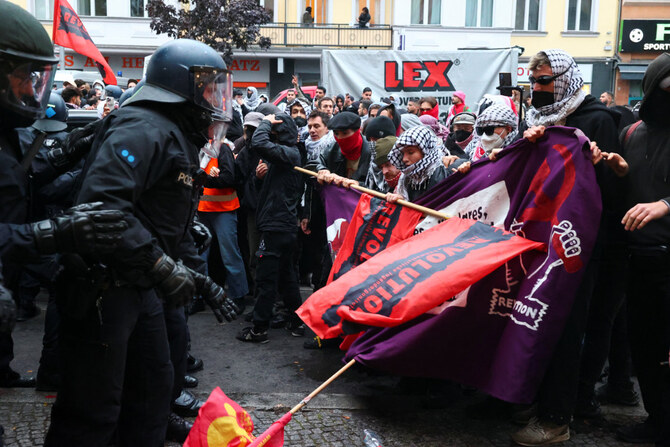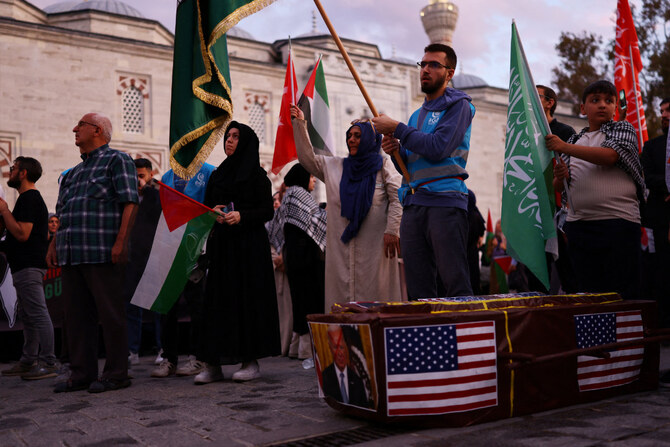RIYADH: People have hit the streets around the world to protest against Israel’s deadly military offensives in Gaza and Lebanon.
Demonstrators expressed outrage against the Israeli aggression, demanding an end to the war in Gaza, describing the situation as “genocide,” and calling upon the global community to act.
Protests have taken place from the Middle East to Europe, the US, India, Pakistan and Far East Asia.
Israel has killed 41,615 Palestinians in Gaza since it launched its brutal offensive in October 2023, according to local health authorities.
The military action has sparked a humanitarian catastrophe in Gaza that has inflamed opinion globally.
Swedish climate activist Greta Thunberg joined thousands of protesters in Stockholm last week to condemn Israel’s “genocide” in Palestine and urged global action to intervene.
“On Saturday, thousands of people and a large number of solidarity movements and organizations filled the streets of Stockholm to stand against oppression and for justice,” Thunberg posted on X.
The demonstration, organized by various NGOs, demanded an immediate ceasefire in the Gaza Strip and unhindered humanitarian aid access.
Thunberg said remaining silent during a genocide is to be complicit and underlined the importance of boycotting Israel, Israeli companies and institutions, and imposing sanctions.
Swedish artist and activist Samuel Girma called Israel “a terrorist state” and urged a boycott of trade with Israel following “terror attacks in Beirut, Lebanon.”
Fellow Swede Dr. Uno Horn condemned Israel’s operations. “They are killing children,” said Horn. “It’s not war; it’s a terror attack.”
Multiple demonstrations broke out in New York City last Thursday, ahead of Israeli Prime Minister Benjamin Netanyahu’s address to the UN General Assembly on Friday.
Thousands of people also gathered at the steps of the New York Public Library and marched toward the UN to hold a rally.
In Pakistan, protesters hit the streets of Karachi on Sunday and clashed with police who stopped them from reaching the US Consulate during demonstrations over Israel’s killing of Hezbollah leader Hassan Nasrallah.
The Indonesian Council of Ulema on Tuesday urged citizens to keep up the fight for “Palestinian independence” by continuing to boycott products over their links to Israel as the war in Gaza nears its one-year mark.
Cholil Nafis, chairman of the council, called on Indonesians to “never stop the boycott movement because the genocide has not stopped either.”
Indian-administered Kashmir was rocked by large anti-Israel, pro-Palestine and pro-Lebanon protests on Sunday that continued on Monday.
Nasrallah’s assassination by Israel has raised political temperatures amid ongoing Jammu and Kashmir regional assembly elections.
Following the Israeli attacks on Beirut, protests unfolded in Helsinki, Finland, where demonstrators demanded an immediate end to Israeli operations in Lebanon.
In Paris, protesters gathered near the famous Fontaine des Innocents, holding banners that read “End the Genocide in Gaza” and “Boycott Israel.”
Many wore keffiyehs and carried images of Palestinian journalist Shireen Abu Akleh, who was killed by Israeli forces in 2022.
Pro-Palestinian protests have been held at universities across the UK since the early days of Israeli offensive in Gaza.
At Newcastle University, a pro-Palestinian encampment was set up on a lawn in front of the college’s buildings. The group responsible describes itself as a “student-led coalition fighting for an end to Newcastle University’s partnership with defense companies supplying Israel.”
Students in the cities of Leeds, Bristol and Warwick have also set up tents outside their university buildings to protest the war in Gaza.
In Paris, pro-Palestinian protests erupted at the Sciences Po university and the Sorbonne University in late April.
As demonstrations escalated in April 2024, more than 2,000 people were arrested on US campuses amid polarized debates over the right to protest, and the limits of free speech.
Clashes with police at New York’s Columbia University, Portland State and UCLA in particular captured global attention.
Several universities across Australia joined the pro-Palestinian protests, with the University of Queensland in Brisbane and University of Sydney becoming gathering points.
Demonstrations and sit-ins have also long been held on campuses in parts of Asia and the Middle East
Jawaharlal Nehru University and Jamia Millia Islamia in New Delhi saw protests with students expressing solidarity with Palestine.
Demonstrations also swept campuses across Canada. At McGill University in downtown Montreal, pro-Palestinian student protesters set up an encampment and like their counterparts in the US, students demanded to divest from companies with ties to Israel.
Campus protests in Lebanon also escalated in late April, with demonstrators waving Palestinian flags and renewing the calls for a boycott.
Protesters demonstrated around the University of Amsterdam campus in the Netherlands in May while in Austria, dozens of protesters camped on the campus of Vienna University, pitching tents and stringing up banners.
Protests also spread to three universities in Lausanne, Geneva and Zurich in Switzerland, and at Free University in the German capital Berlin, a demonstration was held with people erecting a protest camp in a campus courtyard.































